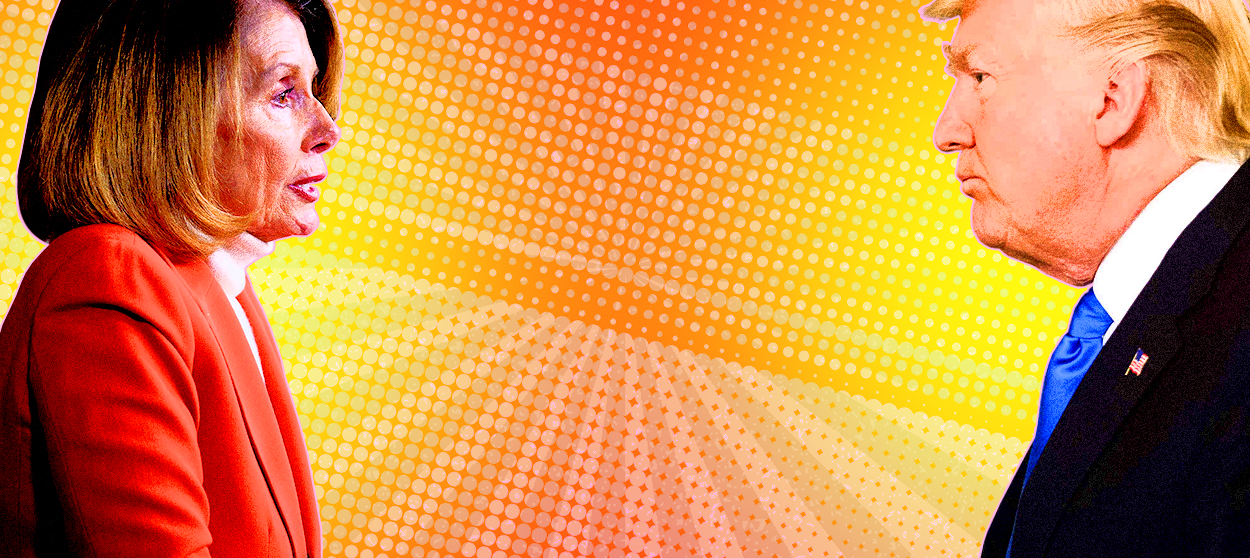7 ways House Democrats could hurdle Trump's subpoena stonewalling
The president says he'll fight "all the subpoenas." Here's how House Democrats could respond.


President Trump said Wednesday that his White House will be "fighting all the subpoenas" from the House. He will also continue refusing to allow testimony from current and former administration officials, on the political — not legal — grounds that House Democrats are partisan and not "impartial people." Trump has always treated the theoretically co-equal legislative branch as a younger sibling, but since Democrats took control of the lower house in January, his view of Congress has apparently shifted from cute plaything to annoying pest.
Some White House officials and Trump allies argue this is a winning strategy to prevent Democrats from obtaining potentially damaging information on Trump until after the 2020 election, even if they ultimately lose their effort to block the subpoenas in court. "Trump's White House appears to have figured out the secret of congressional oversight: There's not much Democrats can do if they say no to everything," Axios notes. But Democrats aren't without options. Here are some tools House Democrats are using or might employ to enforce their oversight responsibilities:
1. Contempt
The Week
Escape your echo chamber. Get the facts behind the news, plus analysis from multiple perspectives.

Sign up for The Week's Free Newsletters
From our morning news briefing to a weekly Good News Newsletter, get the best of The Week delivered directly to your inbox.
From our morning news briefing to a weekly Good News Newsletter, get the best of The Week delivered directly to your inbox.
The House can vote to hold officials in civil or criminal contempt of Congress, opening them up to lawsuits or criminal charges. And in January, The Washington Post reports, House Speaker Nancy Pelosi (D-Calif.) backed an obscure rule giving a three-person panel — made up of House Majority Leader Steny Hoyer (D-Md.), House Minority Leader Kevin McCarthy (R-Calif.), and Pelosi herself — the power to approve civil contempt citations without a full House vote, as a "way to streamline the process" if the White House "sticks with its strategy."
But the Justice Department would have to prosecute those cases, and recent contempt citations — former Attorney General Eric Holder, George W. Bush officials Harriet Miers and Josh Bolten — languished for years, ending in settlements during the next administration.
2. Enforce subpoenas
"Many years ago, Congress ceased trying to enforce its own subpoenas and instead generally seeks to outsource enforcement to the other branches," legal expert Ross Garber tells Politico. Going through the courts is a slow process, but on Wednesday, Rep. Gerald Connolly (D-Va.) proposed taking back that power, the Post reports, suggesting Democrats instruct "the sergeant at arms to find and jail those who defy subpoenas until they relent, a step Congress hasn't taken since the 1870s."
A free daily email with the biggest news stories of the day – and the best features from TheWeek.com
3. Lean on businesses and individuals
The House Judiciary and Oversight committees aren't just subpoenaing the Trump administration but also "businesses, banks, and private individuals" who have done business with Trump or were flagged by Special Counsel Robert Mueller, Politico reports. Companies — especially ones with government business — and individuals are much less likely to defy Congress, and Trump's lawyers have to sue to stop them.
Judiciary Committee Chairman Jerrold Nadler (D-N.Y.) also recently proposed fining or even jailing individuals who don't comply with subpoenas, and Oversight Committee Chair Elijah Cummings (D-Md.) warned Wednesday that "employees and their personal attorneys should think very carefully about their own legal interests rather than being swept up in the obstruction schemes of the Trump administration."
4. Use the power of the purse
"House Democrats have also discussed the idea of tying federal funding to requirements that department and agency heads comply with their investigations," the Post reports. "They've also considered finding ways to enforce an obscure law that bars officials from being paid if they hinder another federal employee from cooperating with Congress."
5. Use the court of public opinion
Trump insisted Wednesday that he had "been the most transparent president and administration in the history of our country by far." But blanket stonewalling "totally undercuts the argument that we've been transparent" and there's "no criminal wrongdoing," a former senior White House officials tells Axios. "Now we look like we've got something to hide and we're not being open and transparent." A source familiar with the House Democrats' investigative plans adds that they "haven't even begun focusing on issues that can be localized" or highlighted to show how Trump's behavior negatively affects voters vulnerable districts or red states.
6. Impeachment
While Trump says he isn't worried about being impeached, his Twitter feed suggests otherwise, and some House Democrats say Trump's blanket obstruction makes impeachment more likely. But presidents aren't the only officials subject to impeachment. On Monday night, Rep. Jared Huffman (D-Calif.) told colleagues they should consider impeaching the IRS commissioner if he refuses to turn over Trump's tax returns.
"The idea that the IRS commissioner would instead follow the direction of Donald Trump's legal team instead of statutory directive just can't stand," Huffman told the Post. Impeachment of the heads of departments and agencies "is the constitutional backstop when executive branch officials refuse to follow the law."
7. Leaks
If Trump won't play ball, "one trend we've been seeing more and more, and a way we can get new information, is from whistleblowers," a senior Democratic aide tells Axios. Say what you want about Trump's White House, but it has never lacked for leakers. Maybe that's what he means by "most transparent."
Peter has worked as a news and culture writer and editor at The Week since the site's launch in 2008. He covers politics, world affairs, religion and cultural currents. His journalism career began as a copy editor at a financial newswire and has included editorial positions at The New York Times Magazine, Facts on File, and Oregon State University.
-
 The small Caribbean island courting crypto billions
The small Caribbean island courting crypto billionsUnder the Radar Crypto mogul Olivier Janssens plans to create a libertarian utopia on Nevis
-
 Political cartoons for December 21
Political cartoons for December 21Cartoons Sunday’s political cartoons include Christmas movies, AI sermons, and more
-
 A luxury walking tour in Western Australia
A luxury walking tour in Western AustraliaThe Week Recommends Walk through an ‘ancient forest’ and listen to the ‘gentle hushing’ of the upper canopy
-
 Has Zohran Mamdani shown the Democrats how to win again?
Has Zohran Mamdani shown the Democrats how to win again?Today’s Big Question New York City mayoral election touted as victory for left-wing populists but moderate centrist wins elsewhere present more complex path for Democratic Party
-
 Millions turn out for anti-Trump ‘No Kings’ rallies
Millions turn out for anti-Trump ‘No Kings’ ralliesSpeed Read An estimated 7 million people participated, 2 million more than at the first ‘No Kings’ protest in June
-
 Ghislaine Maxwell: angling for a Trump pardon
Ghislaine Maxwell: angling for a Trump pardonTalking Point Convicted sex trafficker's testimony could shed new light on president's links to Jeffrey Epstein
-
 The last words and final moments of 40 presidents
The last words and final moments of 40 presidentsThe Explainer Some are eloquent quotes worthy of the holders of the highest office in the nation, and others... aren't
-
 The JFK files: the truth at last?
The JFK files: the truth at last?In The Spotlight More than 64,000 previously classified documents relating the 1963 assassination of John F. Kennedy have been released by the Trump administration
-
 'Seriously, not literally': how should the world take Donald Trump?
'Seriously, not literally': how should the world take Donald Trump?Today's big question White House rhetoric and reality look likely to become increasingly blurred
-
 Will Trump's 'madman' strategy pay off?
Will Trump's 'madman' strategy pay off?Today's Big Question Incoming US president likes to seem unpredictable but, this time round, world leaders could be wise to his playbook
-
 Democrats vs. Republicans: who are US billionaires backing?
Democrats vs. Republicans: who are US billionaires backing?The Explainer Younger tech titans join 'boys' club throwing money and support' behind President Trump, while older plutocrats quietly rebuke new administration
